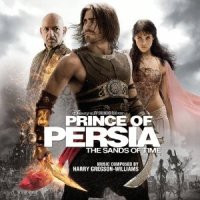- Composed by Harry Gregson-Williams
- Walt Disney Records D000469902 / 2010 / 66:17
An attempt by Disney to build another family-friendly franchise with Jerry Bruckheimer, along the lines of Pirates of the Caribbean, it doesn’t look very likely to happen with Prince of Persia after it opened to fairly disappointing box office. Director Mike Newell has worked with a number of different composers in his career, including Patrick Doyle, Rachel Portman and Elmer Bernstein, and one suspects it was probably Bruckheimer’s decision to hire one-time Zimmer associate Harry Gregson-Williams for this film; it turns out it was a pretty good decision.
Indeed, this is Gregson-Williams’s most entertaining album since Kingdom of Heaven some five years ago; and actually shares a number of stylistic traits with that score, particularly the ethnic elements. What’s different though is the considerably heavier use of electronics here – there’s little doubt that you’re listening to music from a Jerry Bruckheimer film, such is the strong musical brand which has been created for them. The consequence of that is that dramatically and emotionally, this is extremely simplistic – there’s no depth here, no subtext, it is identifiably a score of the Zimmer school in that respect. However, Gregson-Williams applies more skill in creating a (reasonably) consistently interesting sound from his palette of instruments, both real and electronic, than is typical in this type of score. We’re not expected to rely solely on “it’s fun so who cares how simple it is?” as in most Bruckheimer scores – there is enough colour from the orchestration choices to allow the score to move beyond that.
There is a handful of decent themes here, though Gregson-Williams doesn’t extract too much mileage from them – there’s more than a hint of Alan Silvestri’s The Mummy Returns about one of them, which I know will be like manna from heaven for many people. In fact, my main complaint about the album (and in fact, the thing that makes it less flat-out entertaining than the third Pirates score) is that the composer doesn’t really use his themes as often as he might – everything is pretty melodic, but sometimes the melodies are somewhat undistinguished and one feels the score would have been better-served if Gregson-Williams had inserted one of his three or four decent themes in there instead.
Overall though, it’s a satisfying album which will certainly satisfy fans of the Zimmer sound and ought also to please those who crave music slightly more sophisticated in its construction. It’s a relatively long album but never feels overlong, which demonstrates that most of the time there’s something interesting going on. This particular franchise might not take off as intended, but let’s hope Harry Gregson-Williams finds further films like this to work on because they suit him very well. *** 1/2













It‘s quiet in here! Why not leave a response?